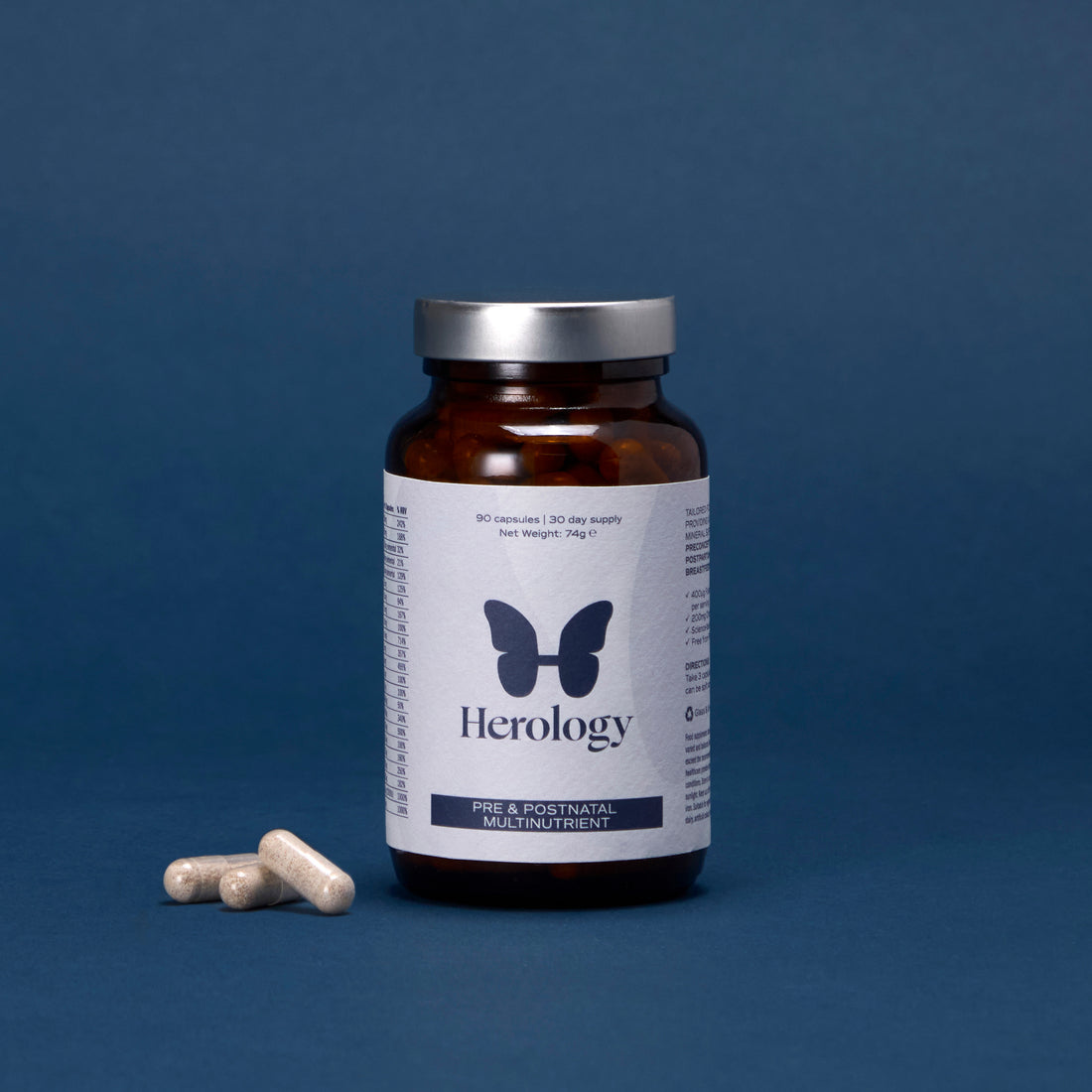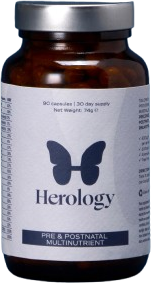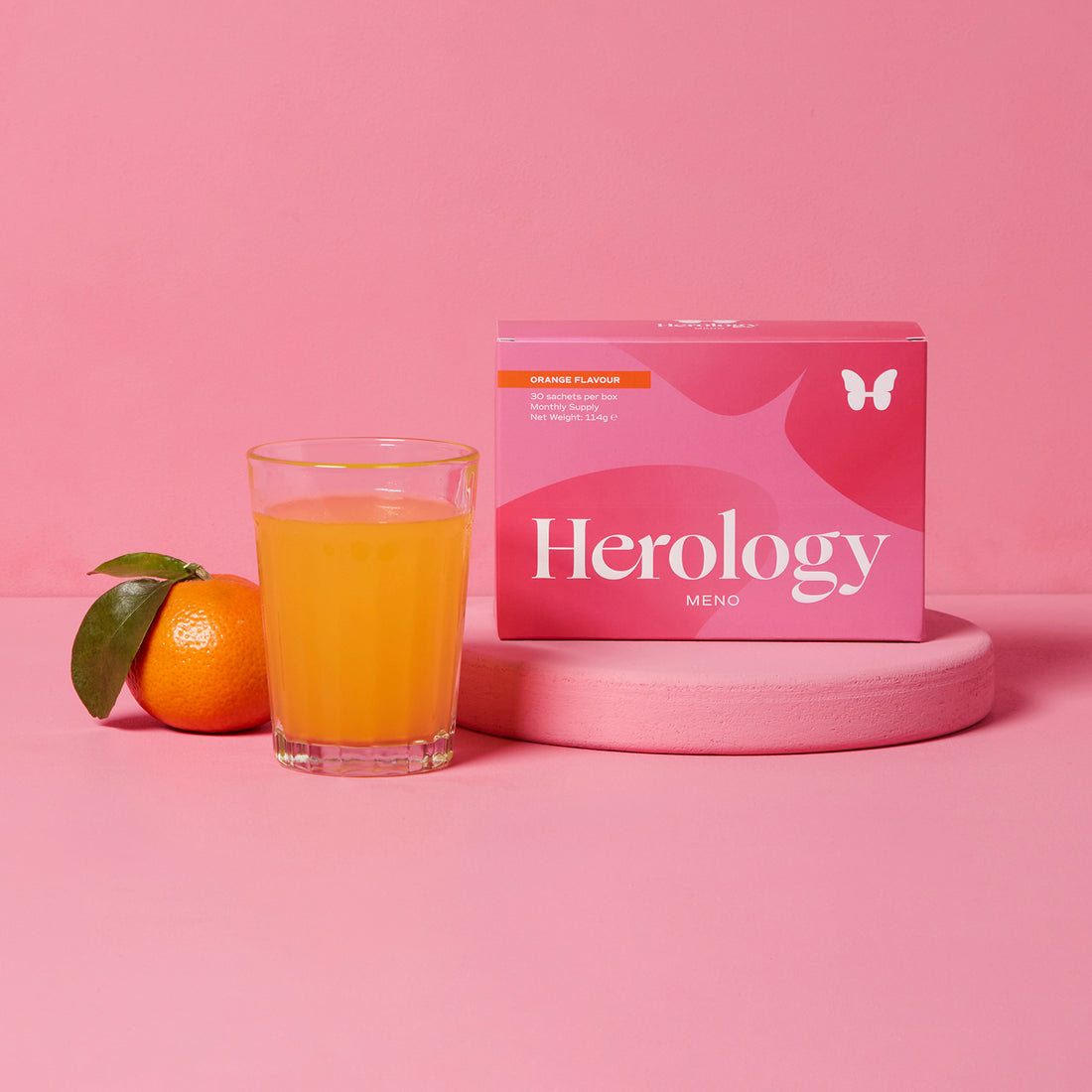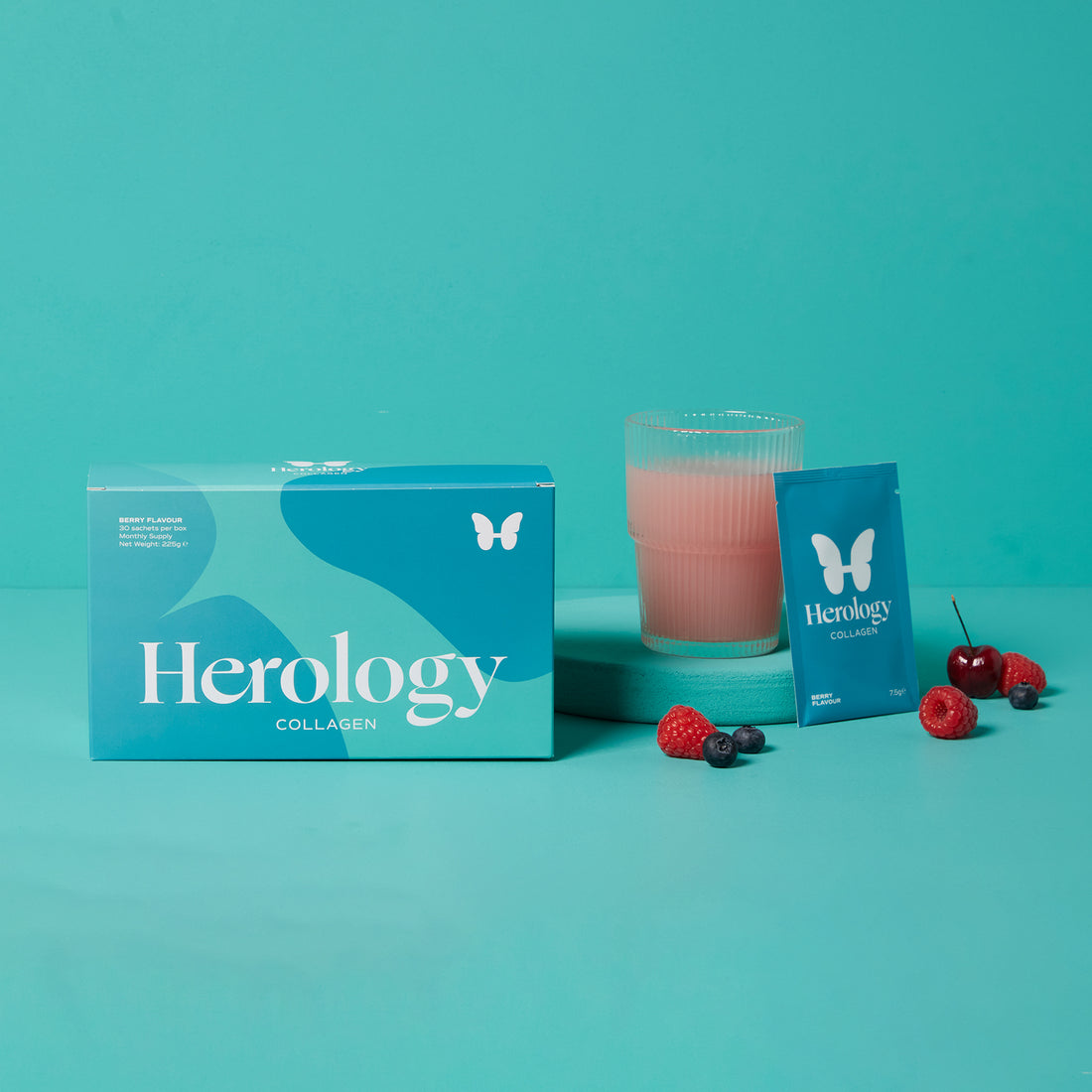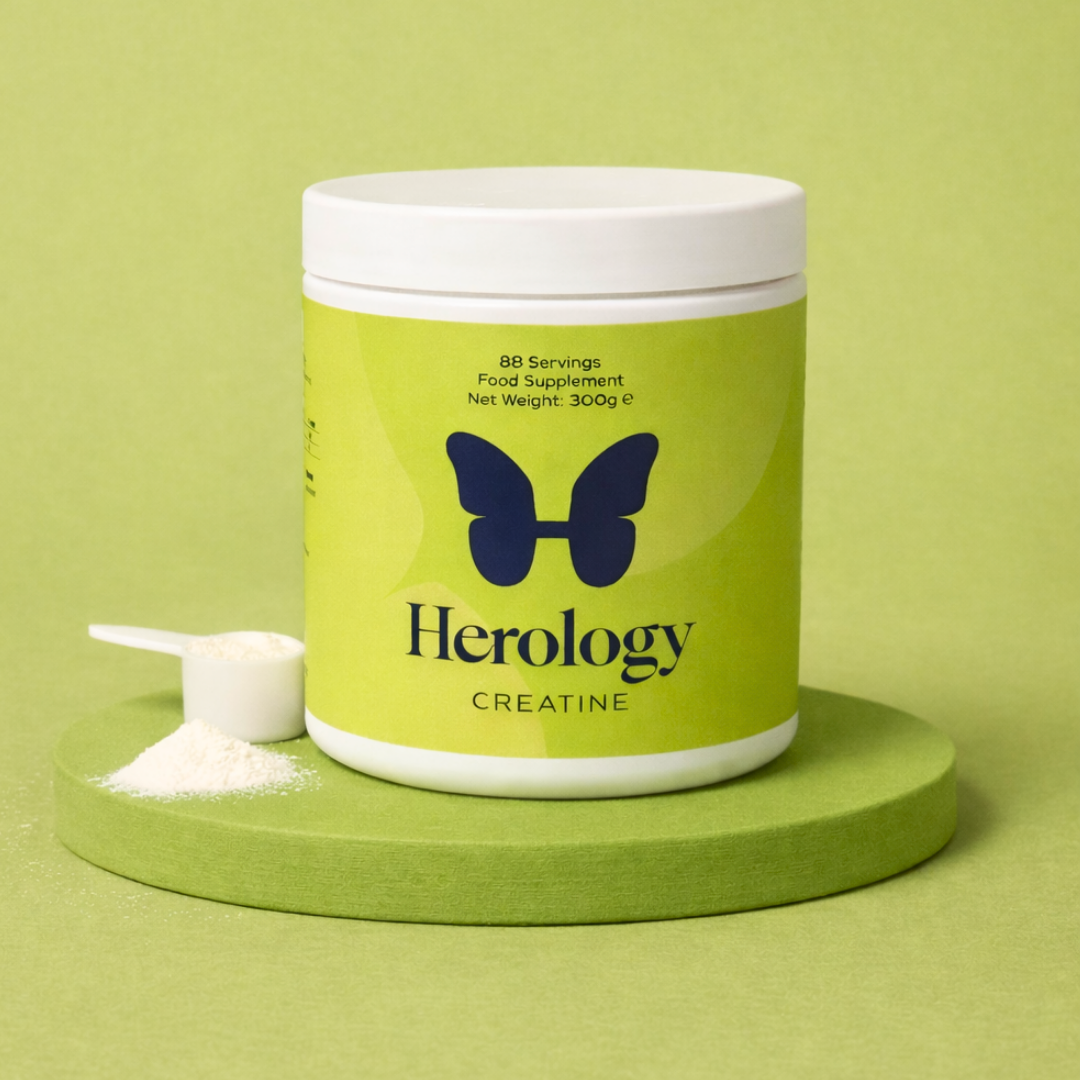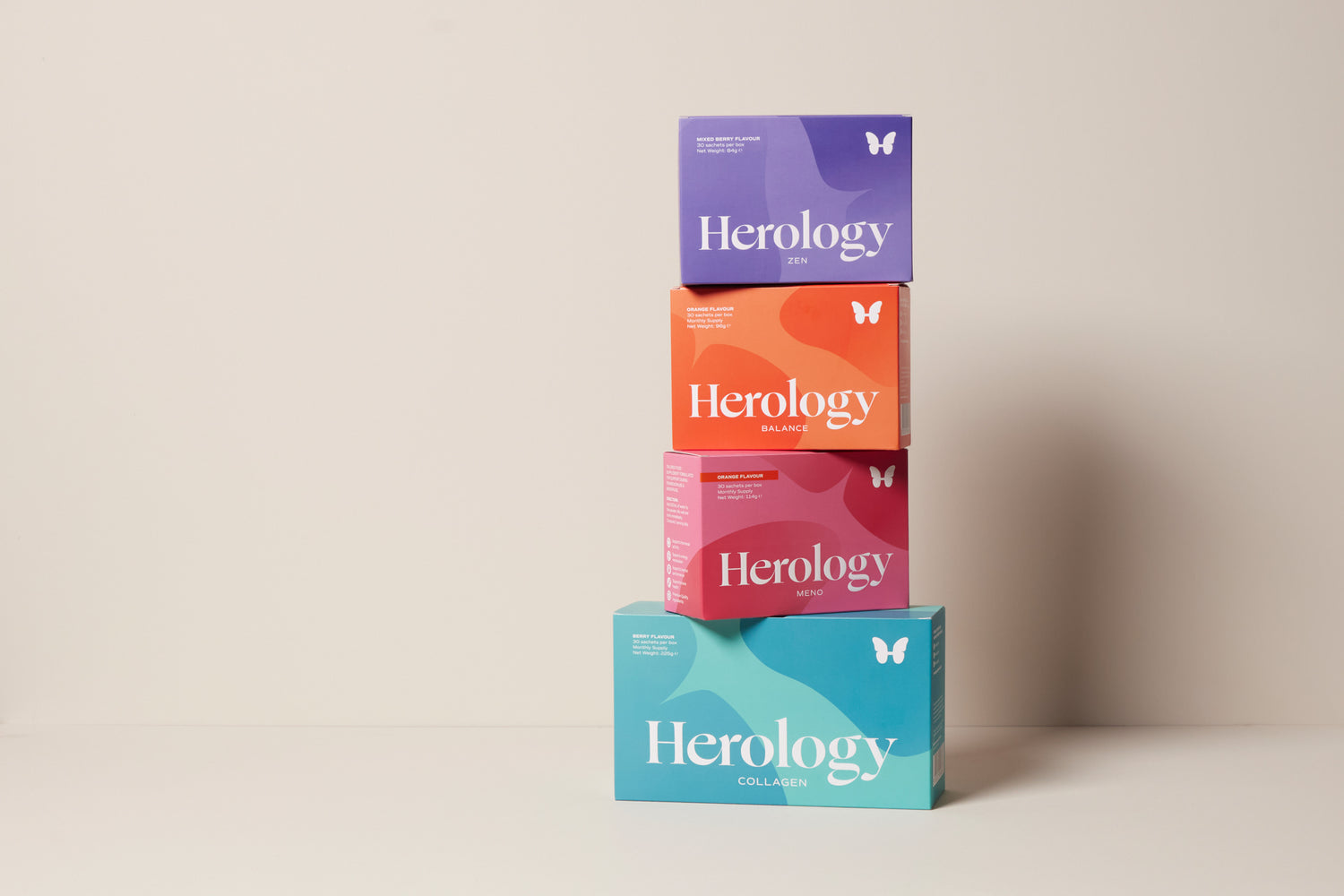RESEARCH HUB
At Herology, science comes first. Our Research Hub features peer-reviewed studies on the ingredients we use, highlighting the science that underpins our formulations. Our commitment to transparency and integrity means openly sharing the benefits as well as the limitations of the research.
Our Research Hub is built to explain the 'why' behind each ingredient, empowering you to make informed decisions about your health.
Balance
Magnesium
Herbal and dietary therapies for primary and secondary dysmenorrhoea (Review)
This Cochrane review found limited but promising evidence that certain herbal and dietary supplements may help reduce menstrual pain. However, most studies were small or methodologically weak, highlighting the need for high-quality trials before clear recommendations can be made.

Magnesium in the gynecological practice: a literature review
Magnesium shows potential benefits across several gynecological conditions, including PMS, dysmenorrhoea, and pregnancy complications, through its muscle-relaxing and anti-inflammatory properties. Evidence supports its use as a safe, supportive option, though dosing guidelines remain inconsistent.

A systematic review and meta-analysis of randomized controlled trials on the effects of magnesium supplementation on insulin sensitivity and glucose control
Across randomized controlled trials, magnesium supplementation modestly improved insulin sensitivity and glycaemic control, especially in those with low magnesium status or metabolic disorders-supporting its role in metabolic health management.

Dietary Glycine Is Rate-Limiting for Glutathione Synthesis and May Have Broad Potential for Health Protection
This review outlines glycine’s critical role in glutathione production, antioxidant defense, and detoxification. Increasing dietary glycine could support multiple aspects of health, particularly under conditions of oxidative stress

The Association Between Serum Magnesium and Premenstrual Syndrome: a Systematic Review and Meta-Analysis of Observational Studies
Observational evidence suggests women with PMS often have lower serum magnesium levels, pointing toward magnesium supplementation as a potentially helpful intervention, pending stronger clinical confirmation.

Effect of magnesium supplementation on women's health and well-being
Magnesium intake was linked to improvements in mood, sleep, and muscle relaxation in women’s health contexts. While promising, more targeted studies are needed to establish cause-and-effect relationships.

Effectiveness of Magnesium on Menstrual Symptoms Among Dysmenorrheal College Students: A Randomized Controlled Trial
In this randomized trial, magnesium supplementation significantly reduced menstrual pain intensity and duration in college students, indicating a safe and affordable intervention for dysmenorrhoea.

Glycine ingestion improves subjective sleep quality in human volunteers, correlating with polysomnographic changes
Human trials show that glycine before bedtime can improve subjective sleep quality and shorten sleep latency, potentially by lowering core body temperature and calming the nervous system.

B Vitamins
Herbal and dietary therapies for primary and secondary dysmenorrhoea
Evidence from small trials suggests some herbal and dietary supplements may help reduce menstrual pain, but methodological weaknesses limit certainty. More robust, high-quality studies are needed before making clear recommendations.

Pyridoxine (vitamin B6) and the premenstrual syndrome: a randomized crossover trial
This trial found vitamin B6 supplementation led to modest improvements in PMS symptoms compared to placebo, particularly mood-related complaints, suggesting a potential role in symptom management.

A Systematic Review and Meta-Analysis of B Vitamin Supplementation on Depressive Symptoms, Anxiety, and Stress: Effects on Healthy and ‘At-Risk’ Individuals
Across multiple RCTs, B vitamin supplementation, especially in individuals at higher risk of deficiency or under stress, was associated with small but significant improvements in mood, anxiety, and perceived stress.

B vitamins, polycystic ovary syndrome, and fertility
This review highlights potential benefits of B vitamins, particularly folate and B12, for hormonal regulation, metabolic health, and fertility in women with PCOS, though more targeted clinical research is warranted

Review Vitamins and Minerals for Energy, Fatigue and Cognition: A Narrative Review of the Biochemical and Clinical Evidence
B vitamins play a critical role in energy metabolism and neurotransmitter function, and supplementation may help reduce fatigue and support cognitive performance, particularly in those with low or suboptimal intakes.

B Vitamins and the Brain: Mechanisms, Dose and Efficacy—A Review
This review describes how B vitamins support brain health by influencing neurotransmitter synthesis, methylation, and myelin formation. Adequate intake appears important for mood regulation and cognitive resilience

Counteracting side effects of combined oral contraceptives through the administration of specific micronutrients
Evidence suggests targeted micronutrient supplementation, including B vitamins, may help offset certain nutrient depletions and side effects associated with oral contraceptive use, supporting overall wellbeing.

Dietary intakes of vitamins B2, B6, and B12 and ovarian cycle function among premenopausal women
Observational findings indicate higher dietary intake of B2, B6, and B12 may be linked to healthier ovulatory function, though causation cannot be confirmed from these data.

A Pilot Randomized Treatment-Controlled Trial Comparing Vitamin B6 with Broad-Spectrum Micronutrients for Premenstrual Syndrome
This small trial found both vitamin B6 alone and a broad-spectrum micronutrient supplement improved PMS symptoms, with the micronutrient group showing slightly greater symptom reduction.

L-theanine
Effects of L-Theanine Administration on Stress-Related Symptoms and Cognitive Functions in Healthy Adults: A Randomized Controlled Trial
Over four weeks, healthy adults taking 200 mg/day of L‑theanine showed modest but statistically significant improvements in stress-related symptoms (depression, anxiety, and sleep quality), as well as enhancements in verbal fluency and executive function. The treatment was well tolerated and suggests L‑theanine may support both mood and cognitive health in non‑clinical populations.

L-Theanine: A Unique Functional Amino Acid in Tea (Camellia sinensis L.) With Multiple Health Benefits and Food Applications
This comprehensive review highlights L‑theanine’s versatility, detailing its calming and cognitive-supportive effects, applications in food and supplements, and potential for enhancing wellbeing broadly - while also urging more high-quality clinical studies to confirm these benefits.

The Effects of Green Tea Amino Acid L-Theanine Consumption on the Ability to Manage Stress and Anxiety Levels: a Systematic Review
This systematic review of nine RCTs found that daily supplementation with 200-400 mg of pure L-theanine may help reduce stress and anxiety in people under stress. While results are promising, the authors note that larger and longer-term studies are needed to confirm its therapeutic role.

L-Theanine reduces psychological and physiological stress responses
A randomized, placebo-controlled crossover trial found that consuming 200 mg of L-theanine attenuated both heart rate and salivary IgA responses during an acute stress task, while also lowering subjective stress levels, suggesting a calming physiological impact without compromising alertness.

Effects of l-theanine on attention and reaction time response
In this placebo-controlled study, 97 healthy adults who consumed 97 mg of L-theanine showed improved accuracy in attention-switching tasks and faster reaction times after demanding mental activities. The findings suggest L-theanine may help sustain focus and cognitive performance under mental stress, without causing sedation.

The effects of L-theanine consumption on sleep outcomes: A systematic review and meta-analysis
This meta-analysis of 18 RCTs (n = 897) found that L-theanine supplementation significantly improved subjective sleep onset latency, daytime functioning, and overall sleep quality, with small to moderate effects. No consistent benefits were observed for objective sleep measures, and most studies combined L-theanine with other ingredients, so further well-controlled trials on pure L-theanine are warranted

Zinc
Efficacy of zinc supplementation for the treatment of dysmenorrhoea: a double-blind randomised controlled trial
In this double-blind RCT, zinc supplementation significantly reduced the severity and duration of menstrual pain compared with placebo. Findings support zinc as a safe, low-cost adjunct for dysmenorrhoea management.

The Effect of Zinc Supplementation on the Improvement of Premenstrual Symptoms in Female University Students: a Randomized Clinical Trial Study
Female university students taking zinc experienced notable improvements in mood, physical, and social symptoms of PMS compared to placebo. The results suggest zinc may be a useful nutritional approach for PMS relief.

The possible role of zinc in the etiopathogenesis of endometriosis
This review proposes that zinc’s antioxidant, anti-inflammatory, and immune-modulating roles may be relevant in the development and progression of endometriosis, though clinical evidence remains limited.

The role of zinc in the treatment of acne: A review of the literature
A literature review indicates zinc, both orally and topically, may help reduce acne severity by modulating inflammation, sebum production, and bacterial growth, making it a potential supportive therapy alongside conventional treatments.

The interplay between oxidative stress, zinc, and metabolic dysfunction in polycystic ovarian syndrome.
This paper explores how zinc deficiency and oxidative stress may contribute to insulin resistance, inflammation, and hormonal imbalance in PCOS, highlighting zinc as a potential target for therapeutic intervention.

Ashwagandha
Adaptogenic and Anxiolytic Effects of Ashwagandha Root Extract in Healthy Adults: A Double-blind, Randomized, Placebo-controlled Clinical Study
This study found that healthy adults taking ashwagandha root extract experienced modest adaptogenic benefits and reduced anxiety compared to placebo, suggesting its potential as a calming supplement. The trial was well‑controlled and generally reaffirmed Ashwagandha's favorable short‑term tolerability.

A Prospective, Randomized Double-Blind, PlaceboControlled Study of Safety and Efficacy of a HighConcentration Full-Spectrum Extract of Ashwagandha Root in Reducing Stress and Anxiety in Adults
In this rigorously designed clinical trial, a high-concentration, full-spectrum ashwagandha extract significantly reduced stress and anxiety measures with minimal side effects, underscoring its promise for short-term use in stressed individuals.

Does Ashwagandha supplementation have a beneficial effect on the management of anxiety and stress? A systematic review and meta‐analysis of randomized controlled trials
This meta-analysis of randomized controlled trials demonstrated that ashwagandha supplementation yields meaningful reductions in perceived stress, anxiety, and cortisol levels, reinforcing its role as a potentially effective stress‑management aid with a favourable safety profile.

Effects of Ashwagandha (Withania Somnifera) on stress and anxiety: A systematic review and meta-analysis.
A recent synthesis of clinical evidence indicates that ashwagandha may reliably lower anxiety and stress markers, further affirming its adaptogenic properties across diverse populations while noting the need for longer-term safety data.

Effect of Ashwagandha (Withania somnifera) extract on sleep: A systematic review and meta-analysis
This PLOS ONE review found a small but statistically significant improvement in sleep quality and duration among adults using ashwagandha, especially at ≥600 mg/day for at least eight weeks, suggesting real potential as a sleep-supportive intervention with generally good short-term safety.

Vitamin D
An Update on the Effects of Vitamin D on the Immune System and Autoimmune Diseases
This review summarizes evidence linking vitamin D to immune regulation, showing potential benefits in reducing inflammation and modulating autoimmune disease activity. While promising, optimal dosing and causal pathways remain under investigation.

Immunologic Effects of Vitamin D on Human Health and Disease
Vitamin D plays a key role in innate and adaptive immunity, with deficiency associated with higher susceptibility to infections and immune-mediated diseases. Supplementation may support immune health, particularly in deficient populations.

The effect of vitamin D supplementation on depression: a systematic review and dose-response meta-analysis of randomized controlled trials
A large meta-analysis of RCTs found that vitamin D supplementation was associated with modest improvements in depressive symptoms, especially in individuals with low baseline vitamin D levels or clinical depression.

Shedding new light on female fertility: The role of vitamin D
This review highlights vitamin D’s potential influence on ovarian function, reproductive hormones, and implantation, suggesting possible benefits for fertility, though robust intervention trials are limited.

Vitamin D in Reproductive Health Disorders: A Narrative Review Focusing on Infertility, Endometriosis, and Polycystic Ovarian Syndrome
Vitamin D deficiency is commonly observed in infertility, endometriosis, and PCOS, and supplementation may improve reproductive outcomes in some cases. Evidence is encouraging but not yet conclusive.

The combination effect of vitamin K and vitamin D on human bone quality: a meta-analysis of randomized controlled trials.
Combining vitamins D and K in supplementation regimens appears to improve bone mineral density and quality more than vitamin D alone, suggesting a synergistic effect.

The Synergistic Interplay between Vitamins D and K for Bone and Cardiovascular Health: A Narrative Review
This narrative review outlines how vitamins D and K may work together to support both bone strength and vascular health, potentially reducing the risk of fractures and arterial calcification.

Fracture prevention with vitamin D supplementation: a meta-analysis of randomized controlled trials
Pooled data from RCTs suggest vitamin D supplementation, particularly when combined with calcium, may modestly reduce fracture risk, especially in older adults and those with low baseline vitamin D.

Vitamin D supplementation for depressive symptoms: a systematic review and meta-analysis of randomized controlled trials
This earlier meta-analysis found small but significant improvements in mood with vitamin D supplementation, with the strongest effects in people with deficiency or more severe baseline symptoms.

Vitamin K
The Synergistic Interplay between Vitamins D and K for Bone and Cardiovascular Health: A Narrative Review
This review outlines how vitamins D and K may work together to enhance bone mineralization while reducing vascular calcification risk. The combination may offer broader skeletal and cardiovascular benefits than either nutrient alone.

The combination effect of vitamin K and vitamin D on human bone quality: a meta-analysis of randomized controlled trials
Pooled results from randomized controlled trials suggest that combined supplementation with vitamins D and K significantly improves bone mineral density and bone quality compared to vitamin D alone, particularly in postmenopausal women.

The Importance of Vitamin K and the Combination of Vitamins K and D for Calcium Metabolism and Bone Health: A Review
Vitamin K supports calcium utilization in bone tissue, and when paired with vitamin D, may optimize bone strength and reduce fracture risk. The review emphasizes that both nutrients are critical for effective calcium metabolism.

Investigating the Effects and Mechanisms of Combined Vitamin D and K Supplementation in Postmenopausal Women: An Up-to-Date Comprehensive Review of Clinical Studies
This review highlights that combined D+K supplementation can improve bone turnover markers, support bone density, and potentially protect cardiovascular health in postmenopausal women, though optimal dosages require further study.

Meno
Magnesium
Herbal and dietary therapies for primary and secondary dysmenorrhoea (Review)
This Cochrane review found limited but promising evidence that certain herbal and dietary supplements may help reduce menstrual pain. However, most studies were small or methodologically weak, highlighting the need for high-quality trials before clear recommendations can be made.

Magnesium in the gynecological practice: a literature review
Magnesium shows potential benefits across several gynecological conditions, including PMS, dysmenorrhoea, and pregnancy complications, through its muscle-relaxing and anti-inflammatory properties. Evidence supports its use as a safe, supportive option, though dosing guidelines remain inconsistent.

A systematic review and meta-analysis of randomized controlled trials on the effects of magnesium supplementation on insulin sensitivity and glucose control
Across randomized controlled trials, magnesium supplementation modestly improved insulin sensitivity and glycaemic control, especially in those with low magnesium status or metabolic disorders-supporting its role in metabolic health management.

Dietary Glycine Is Rate-Limiting for Glutathione Synthesis and May Have Broad Potential for Health Protection
This review outlines glycine’s critical role in glutathione production, antioxidant defense, and detoxification. Increasing dietary glycine could support multiple aspects of health, particularly under conditions of oxidative stress

The Association Between Serum Magnesium and Premenstrual Syndrome: a Systematic Review and Meta-Analysis of Observational Studies
Observational evidence suggests women with PMS often have lower serum magnesium levels, pointing toward magnesium supplementation as a potentially helpful intervention, pending stronger clinical confirmation.

Effect of magnesium supplementation on women's health and well-being
Magnesium intake was linked to improvements in mood, sleep, and muscle relaxation in women’s health contexts. While promising, more targeted studies are needed to establish cause-and-effect relationships.

Effectiveness of Magnesium on Menstrual Symptoms Among Dysmenorrheal College Students: A Randomized Controlled Trial
In this randomized trial, magnesium supplementation significantly reduced menstrual pain intensity and duration in college students, indicating a safe and affordable intervention for dysmenorrhoea.

Glycine ingestion improves subjective sleep quality in human volunteers, correlating with polysomnographic changes
Human trials show that glycine before bedtime can improve subjective sleep quality and shorten sleep latency, potentially by lowering core body temperature and calming the nervous system.

B Vitamins
Herbal and dietary therapies for primary and secondary dysmenorrhoea
Evidence from small trials suggests some herbal and dietary supplements may help reduce menstrual pain, but methodological weaknesses limit certainty. More robust, high-quality studies are needed before making clear recommendations.

Pyridoxine (vitamin B6) and the premenstrual syndrome: a randomized crossover trial
This trial found vitamin B6 supplementation led to modest improvements in PMS symptoms compared to placebo, particularly mood-related complaints, suggesting a potential role in symptom management.

A Systematic Review and Meta-Analysis of B Vitamin Supplementation on Depressive Symptoms, Anxiety, and Stress: Effects on Healthy and ‘At-Risk’ Individuals
Across multiple RCTs, B vitamin supplementation, especially in individuals at higher risk of deficiency or under stress, was associated with small but significant improvements in mood, anxiety, and perceived stress.

B vitamins, polycystic ovary syndrome, and fertility
This review highlights potential benefits of B vitamins, particularly folate and B12, for hormonal regulation, metabolic health, and fertility in women with PCOS, though more targeted clinical research is warranted

Review Vitamins and Minerals for Energy, Fatigue and Cognition: A Narrative Review of the Biochemical and Clinical Evidence
B vitamins play a critical role in energy metabolism and neurotransmitter function, and supplementation may help reduce fatigue and support cognitive performance, particularly in those with low or suboptimal intakes.

B Vitamins and the Brain: Mechanisms, Dose and Efficacy—A Review
This review describes how B vitamins support brain health by influencing neurotransmitter synthesis, methylation, and myelin formation. Adequate intake appears important for mood regulation and cognitive resilience

Counteracting side effects of combined oral contraceptives through the administration of specific micronutrients
Evidence suggests targeted micronutrient supplementation, including B vitamins, may help offset certain nutrient depletions and side effects associated with oral contraceptive use, supporting overall wellbeing.

Dietary intakes of vitamins B2, B6, and B12 and ovarian cycle function among premenopausal women
Observational findings indicate higher dietary intake of B2, B6, and B12 may be linked to healthier ovulatory function, though causation cannot be confirmed from these data.

A Pilot Randomized Treatment-Controlled Trial Comparing Vitamin B6 with Broad-Spectrum Micronutrients for Premenstrual Syndrome
This small trial found both vitamin B6 alone and a broad-spectrum micronutrient supplement improved PMS symptoms, with the micronutrient group showing slightly greater symptom reduction.

L-theanine
Effects of L-Theanine Administration on Stress-Related Symptoms and Cognitive Functions in Healthy Adults: A Randomized Controlled Trial
Over four weeks, healthy adults taking 200 mg/day of L‑theanine showed modest but statistically significant improvements in stress-related symptoms (depression, anxiety, and sleep quality), as well as enhancements in verbal fluency and executive function. The treatment was well tolerated and suggests L‑theanine may support both mood and cognitive health in non‑clinical populations.

L-Theanine: A Unique Functional Amino Acid in Tea (Camellia sinensis L.) With Multiple Health Benefits and Food Applications
This comprehensive review highlights L‑theanine’s versatility, detailing its calming and cognitive-supportive effects, applications in food and supplements, and potential for enhancing wellbeing broadly - while also urging more high-quality clinical studies to confirm these benefits.

The Effects of Green Tea Amino Acid L-Theanine Consumption on the Ability to Manage Stress and Anxiety Levels: a Systematic Review
This systematic review of nine RCTs found that daily supplementation with 200-400 mg of pure L-theanine may help reduce stress and anxiety in people under stress. While results are promising, the authors note that larger and longer-term studies are needed to confirm its therapeutic role.

L-Theanine reduces psychological and physiological stress responses
A randomized, placebo-controlled crossover trial found that consuming 200 mg of L-theanine attenuated both heart rate and salivary IgA responses during an acute stress task, while also lowering subjective stress levels, suggesting a calming physiological impact without compromising alertness.

Effects of l-theanine on attention and reaction time response
In this placebo-controlled study, 97 healthy adults who consumed 97 mg of L-theanine showed improved accuracy in attention-switching tasks and faster reaction times after demanding mental activities. The findings suggest L-theanine may help sustain focus and cognitive performance under mental stress, without causing sedation.

The effects of L-theanine consumption on sleep outcomes: A systematic review and meta-analysis
This meta-analysis of 18 RCTs (n = 897) found that L-theanine supplementation significantly improved subjective sleep onset latency, daytime functioning, and overall sleep quality, with small to moderate effects. No consistent benefits were observed for objective sleep measures, and most studies combined L-theanine with other ingredients, so further well-controlled trials on pure L-theanine are warranted

Zinc
Efficacy of zinc supplementation for the treatment of dysmenorrhoea: a double-blind randomised controlled trial
In this double-blind RCT, zinc supplementation significantly reduced the severity and duration of menstrual pain compared with placebo. Findings support zinc as a safe, low-cost adjunct for dysmenorrhoea management.

The Effect of Zinc Supplementation on the Improvement of Premenstrual Symptoms in Female University Students: a Randomized Clinical Trial Study
Female university students taking zinc experienced notable improvements in mood, physical, and social symptoms of PMS compared to placebo. The results suggest zinc may be a useful nutritional approach for PMS relief.

The possible role of zinc in the etiopathogenesis of endometriosis
This review proposes that zinc’s antioxidant, anti-inflammatory, and immune-modulating roles may be relevant in the development and progression of endometriosis, though clinical evidence remains limited.

The role of zinc in the treatment of acne: A review of the literature
A literature review indicates zinc, both orally and topically, may help reduce acne severity by modulating inflammation, sebum production, and bacterial growth, making it a potential supportive therapy alongside conventional treatments.

The interplay between oxidative stress, zinc, and metabolic dysfunction in polycystic ovarian syndrome.
This paper explores how zinc deficiency and oxidative stress may contribute to insulin resistance, inflammation, and hormonal imbalance in PCOS, highlighting zinc as a potential target for therapeutic intervention.

Ashwagandha
Adaptogenic and Anxiolytic Effects of Ashwagandha Root Extract in Healthy Adults: A Double-blind, Randomized, Placebo-controlled Clinical Study
This study found that healthy adults taking ashwagandha root extract experienced modest adaptogenic benefits and reduced anxiety compared to placebo, suggesting its potential as a calming supplement. The trial was well‑controlled and generally reaffirmed Ashwagandha's favorable short‑term tolerability.

A Prospective, Randomized Double-Blind, PlaceboControlled Study of Safety and Efficacy of a HighConcentration Full-Spectrum Extract of Ashwagandha Root in Reducing Stress and Anxiety in Adults
In this rigorously designed clinical trial, a high-concentration, full-spectrum ashwagandha extract significantly reduced stress and anxiety measures with minimal side effects, underscoring its promise for short-term use in stressed individuals.

Does Ashwagandha supplementation have a beneficial effect on the management of anxiety and stress? A systematic review and meta‐analysis of randomized controlled trials
This meta-analysis of randomized controlled trials demonstrated that ashwagandha supplementation yields meaningful reductions in perceived stress, anxiety, and cortisol levels, reinforcing its role as a potentially effective stress‑management aid with a favourable safety profile.

Effects of Ashwagandha (Withania Somnifera) on stress and anxiety: A systematic review and meta-analysis.
A recent synthesis of clinical evidence indicates that ashwagandha may reliably lower anxiety and stress markers, further affirming its adaptogenic properties across diverse populations while noting the need for longer-term safety data.

Effect of Ashwagandha (Withania somnifera) extract on sleep: A systematic review and meta-analysis
This PLOS ONE review found a small but statistically significant improvement in sleep quality and duration among adults using ashwagandha, especially at ≥600 mg/day for at least eight weeks, suggesting real potential as a sleep-supportive intervention with generally good short-term safety.

Sage Leaf
First time proof of sage's tolerability and efficacy in menopausal women with hot flushes
In this open-label trial, daily supplementation with fresh sage leaves reduced the frequency and severity of hot flushes in menopausal women, with good tolerability and no serious side effects reported.

The Acute and Chronic Cognitive Effects of a Sage Extract: A Randomized, Placebo Controlled Study in Healthy Humans
This randomized, placebo-controlled trial found that a standardized sage extract improved attention, memory, and mood both acutely and after chronic supplementation in healthy adults, suggesting cognitive-supportive properties.

The effect of Saliva officinalis extract on the menopausal symptoms in postmenopausal women: An RCT
In this randomized clinical trial, sage extract significantly reduced the severity of common menopausal symptoms, including hot flushes, night sweats, and mood disturbances, compared to placebo.

A review of effective herbal medicines in controlling menopausal symptoms
This review highlights sage among several herbal options with evidence for alleviating menopausal symptoms, particularly hot flushes and mood disturbances, though more large-scale, high-quality trials are needed.

Shatavari
Efficacy and Safety of Shatavari Root Extract for the Management of Menopausal Symptoms: A Double-Blind, Multicenter, Randomized Controlled Trial
This large double-blind RCT found that shatavari root extract significantly reduced menopausal symptom scores, including hot flushes and sleep disturbances, compared with placebo, with good tolerability and no major safety concerns.

A Standardized Asparagus Racemosus Root Extract Improves Hormonal Balance and Menstrual Health and Reduces Vasomotor Symptoms in Perimenopausal Women: A Randomized, Double-Blind, Placebo-Controlled Study
In this placebo-controlled trial, standardized shatavari extract improved hormonal balance, reduced vasomotor symptoms, and supported menstrual health in perimenopausal women over 12 weeks.

Understanding the Role of Shatavari (Asparagus racemosus) in Enhancing Female Fertility a Traditional Perspective
This review from an Ayurvedic perspective describes shatavari as a female reproductive tonic, traditionally used to promote hormonal balance, improve fertility, and support overall reproductive health - though modern clinical validation is still limited.

Maca Root
Systematic Review On The Use Of Maca (Lepidium Meyenii) In Sexual Dysfunction
This review found limited but promising evidence that maca supplementation may improve sexual desire and function in both men and women, with a good safety profile. However, studies are small and heterogeneous, so stronger trials are needed.

Peruvian Maca and Possible Impact on Fertility
Evidence suggests maca may increase libido and improve some menopause-related symptoms in women, with potential benefits for reproductive health. Mechanistic and clinical data are still emerging.

Acceptability, Safety, and Efficacy of Oral Administration of Extracts of Black or Red Maca (Lepidium meyenii) in Adult Human Subjects: A Randomized, Double-Blind, Placebo-Controlled Study
In this randomized, double-blind, placebo-controlled trial, both black and red maca extracts were well tolerated and associated with improvements in mood, energy, and some sexual function measures compared with placebo.

Hormone-Balancing Effect of Pre-Gelatinized Organic Maca (Lepidium peruvianum Chacon): (III) Clinical responses of early-postmenopausal women to Maca in double blind, randomized, Placebo-controlled, crossover configuration, outpatient study
This crossover trial found that maca supplementation improved menopausal symptoms such as hot flushes and mood disturbances, without altering sex hormone levels, suggesting its effects may be non-hormonal in mechanism.

Red Clover
Effectiveness of Commercial Red Clover (Trifolium pratense L.) Products for the Treatment of Symptoms in Menopausal Women—A Narrative Review
This review reports that red clover isoflavone supplements may help improve various menopausal symptoms, particularly hot flushes, though results vary across commercial preparations and study designs.

Evaluation of Clinical Meaningfulness of Red Clover (Trifolium pratense L.) Extract to Relieve Hot Flushes and Menopausal Symptoms in Peri- and Post-Menopausal Women: A Systematic Review and Meta-Analysis of Randomized Controlled Trials
A meta-analysis of RCTs found red clover extract modestly reduced hot flush frequency and severity in peri- and postmenopausal women compared with placebo, with a good safety profile.

Isoflavones from red clover (Promensil®) significantly reduce menopausal hot flush symptoms compared with placebo
This placebo-controlled trial showed that Promensil® significantly decreased hot flush frequency in postmenopausal women over 12 weeks, suggesting benefit for vasomotor symptom relief.

Effectiveness of red clover in alleviating menopausal symptoms: a 12-week randomized, controlled trial
Women taking red clover isoflavones reported reduced hot flushes and improved menopause symptom scores compared with control, with good tolerability.

Isoflavones obtained from red clover improve both dyslipidemia and menopausal symptoms in menopausal women: a prospective randomized placebo-controlled trial
Over 3-6 months, red clover supplementation significantly improved lipid profiles and reduced menopausal symptoms, indicating both cardiovascular and quality-of-life benefits.

The Effect of Red Clover on Severity of Physical Menopause Symptoms
This study found that red clover supplementation was associated with reductions in physical menopause symptoms such as hot flushes and night sweats, although the magnitude of benefit varied Between individuals.

Vitamin C
The Effects of Dietary Supplementation with Collagen and Vitamin C and Their Combination with Hyaluronic Acid on Skin Density, Texture and Other Parameters: A Randomised, Double-Blind, Placebo-Controlled Trial
In a gold-standard double-blind RCT, supplementation with collagen and vitamin C - especially when combined with hyaluronic acid - significantly improved skin density, smoothness, and hydration while reducing visible signs of aging. Participants experienced a noticeable glow and firmer, more youthful skin in just weeks.

Role of Vitamin C in Skin Aging Mechanism-A Narrative Review
This review confirms vitamin C’s vital role in collagen synthesis, antioxidant protection, and prevention of UV-induced skin damage. By fighting oxidative stress and stimulating new collagen, vitamin C helps maintain youthful, firm, and radiant skin.

Vitamin D
An Update on the Effects of Vitamin D on the Immune System and Autoimmune Diseases
This review summarizes evidence linking vitamin D to immune regulation, showing potential benefits in reducing inflammation and modulating autoimmune disease activity. While promising, optimal dosing and causal pathways remain under investigation.

Immunologic Effects of Vitamin D on Human Health and Disease
Vitamin D plays a key role in innate and adaptive immunity, with deficiency associated with higher susceptibility to infections and immune-mediated diseases. Supplementation may support immune health, particularly in deficient populations.

The effect of vitamin D supplementation on depression: a systematic review and dose-response meta-analysis of randomized controlled trials
A large meta-analysis of RCTs found that vitamin D supplementation was associated with modest improvements in depressive symptoms, especially in individuals with low baseline vitamin D levels or clinical depression.

Shedding new light on female fertility: The role of vitamin D
This review highlights vitamin D’s potential influence on ovarian function, reproductive hormones, and implantation, suggesting possible benefits for fertility, though robust intervention trials are limited.

Vitamin D in Reproductive Health Disorders: A Narrative Review Focusing on Infertility, Endometriosis, and Polycystic Ovarian Syndrome
Vitamin D deficiency is commonly observed in infertility, endometriosis, and PCOS, and supplementation may improve reproductive outcomes in some cases. Evidence is encouraging but not yet conclusive.

The combination effect of vitamin K and vitamin D on human bone quality: a meta-analysis of randomized controlled trials.
Combining vitamins D and K in supplementation regimens appears to improve bone mineral density and quality more than vitamin D alone, suggesting a synergistic effect.

The Synergistic Interplay between Vitamins D and K for Bone and Cardiovascular Health: A Narrative Review
This narrative review outlines how vitamins D and K may work together to support both bone strength and vascular health, potentially reducing the risk of fractures and arterial calcification.

Fracture prevention with vitamin D supplementation: a meta-analysis of randomized controlled trials
Pooled data from RCTs suggest vitamin D supplementation, particularly when combined with calcium, may modestly reduce fracture risk, especially in older adults and those with low baseline vitamin D.

Vitamin D supplementation for depressive symptoms: a systematic review and meta-analysis of randomized controlled trials
This earlier meta-analysis found small but significant improvements in mood with vitamin D supplementation, with the strongest effects in people with deficiency or more severe baseline symptoms.

Vitamin K
The Synergistic Interplay between Vitamins D and K for Bone and Cardiovascular Health: A Narrative Review
This review outlines how vitamins D and K may work together to enhance bone mineralization while reducing vascular calcification risk. The combination may offer broader skeletal and cardiovascular benefits than either nutrient alone.

The combination effect of vitamin K and vitamin D on human bone quality: a meta-analysis of randomized controlled trials
Pooled results from randomized controlled trials suggest that combined supplementation with vitamins D and K significantly improves bone mineral density and bone quality compared to vitamin D alone, particularly in postmenopausal women.

The Importance of Vitamin K and the Combination of Vitamins K and D for Calcium Metabolism and Bone Health: A Review
Vitamin K supports calcium utilization in bone tissue, and when paired with vitamin D, may optimize bone strength and reduce fracture risk. The review emphasizes that both nutrients are critical for effective calcium metabolism.

Investigating the Effects and Mechanisms of Combined Vitamin D and K Supplementation in Postmenopausal Women: An Up-to-Date Comprehensive Review of Clinical Studies
This review highlights that combined D+K supplementation can improve bone turnover markers, support bone density, and potentially protect cardiovascular health in postmenopausal women, though optimal dosages require further study.

Zen
Magnesium
Herbal and dietary therapies for primary and secondary dysmenorrhoea (Review)
This Cochrane review found limited but promising evidence that certain herbal and dietary supplements may help reduce menstrual pain. However, most studies were small or methodologically weak, highlighting the need for high-quality trials before clear recommendations can be made.

Magnesium in the gynecological practice: a literature review
Magnesium shows potential benefits across several gynecological conditions, including PMS, dysmenorrhoea, and pregnancy complications, through its muscle-relaxing and anti-inflammatory properties. Evidence supports its use as a safe, supportive option, though dosing guidelines remain inconsistent.

A systematic review and meta-analysis of randomized controlled trials on the effects of magnesium supplementation on insulin sensitivity and glucose control
Across randomized controlled trials, magnesium supplementation modestly improved insulin sensitivity and glycaemic control, especially in those with low magnesium status or metabolic disorders-supporting its role in metabolic health management.

Dietary Glycine Is Rate-Limiting for Glutathione Synthesis and May Have Broad Potential for Health Protection
This review outlines glycine’s critical role in glutathione production, antioxidant defense, and detoxification. Increasing dietary glycine could support multiple aspects of health, particularly under conditions of oxidative stress

The Association Between Serum Magnesium and Premenstrual Syndrome: a Systematic Review and Meta-Analysis of Observational Studies
Observational evidence suggests women with PMS often have lower serum magnesium levels, pointing toward magnesium supplementation as a potentially helpful intervention, pending stronger clinical confirmation.

Effect of magnesium supplementation on women's health and well-being
Magnesium intake was linked to improvements in mood, sleep, and muscle relaxation in women’s health contexts. While promising, more targeted studies are needed to establish cause-and-effect relationships.

Effectiveness of Magnesium on Menstrual Symptoms Among Dysmenorrheal College Students: A Randomized Controlled Trial
In this randomized trial, magnesium supplementation significantly reduced menstrual pain intensity and duration in college students, indicating a safe and affordable intervention for dysmenorrhoea.

Glycine ingestion improves subjective sleep quality in human volunteers, correlating with polysomnographic changes
Human trials show that glycine before bedtime can improve subjective sleep quality and shorten sleep latency, potentially by lowering core body temperature and calming the nervous system.

B Vitamins
Herbal and dietary therapies for primary and secondary dysmenorrhoea
Evidence from small trials suggests some herbal and dietary supplements may help reduce menstrual pain, but methodological weaknesses limit certainty. More robust, high-quality studies are needed before making clear recommendations.

Pyridoxine (vitamin B6) and the premenstrual syndrome: a randomized crossover trial
This trial found vitamin B6 supplementation led to modest improvements in PMS symptoms compared to placebo, particularly mood-related complaints, suggesting a potential role in symptom management.

A Systematic Review and Meta-Analysis of B Vitamin Supplementation on Depressive Symptoms, Anxiety, and Stress: Effects on Healthy and ‘At-Risk’ Individuals
Across multiple RCTs, B vitamin supplementation, especially in individuals at higher risk of deficiency or under stress, was associated with small but significant improvements in mood, anxiety, and perceived stress.

B vitamins, polycystic ovary syndrome, and fertility
This review highlights potential benefits of B vitamins, particularly folate and B12, for hormonal regulation, metabolic health, and fertility in women with PCOS, though more targeted clinical research is warranted

Review Vitamins and Minerals for Energy, Fatigue and Cognition: A Narrative Review of the Biochemical and Clinical Evidence
B vitamins play a critical role in energy metabolism and neurotransmitter function, and supplementation may help reduce fatigue and support cognitive performance, particularly in those with low or suboptimal intakes.

B Vitamins and the Brain: Mechanisms, Dose and Efficacy—A Review
This review describes how B vitamins support brain health by influencing neurotransmitter synthesis, methylation, and myelin formation. Adequate intake appears important for mood regulation and cognitive resilience

Counteracting side effects of combined oral contraceptives through the administration of specific micronutrients
Evidence suggests targeted micronutrient supplementation, including B vitamins, may help offset certain nutrient depletions and side effects associated with oral contraceptive use, supporting overall wellbeing.

Dietary intakes of vitamins B2, B6, and B12 and ovarian cycle function among premenopausal women
Observational findings indicate higher dietary intake of B2, B6, and B12 may be linked to healthier ovulatory function, though causation cannot be confirmed from these data.

A Pilot Randomized Treatment-Controlled Trial Comparing Vitamin B6 with Broad-Spectrum Micronutrients for Premenstrual Syndrome
This small trial found both vitamin B6 alone and a broad-spectrum micronutrient supplement improved PMS symptoms, with the micronutrient group showing slightly greater symptom reduction.

Collagen
VERISOL®
Oral Intake of Specific Bioactive Collagen Peptides Reduces Skin Wrinkles and Increases Dermal Matrix Synthesis
In this placebo-controlled study, daily supplementation with specific bioactive collagen peptides significantly reduced eye wrinkle volume and increased dermal collagen density, indicating improved skin structure.

The oral intake of specific Bioactive Collagen Peptides has a positive effect on hair thickness
This trial found that collagen peptide supplementation increased hair thickness in women with thinning hair, suggesting potential benefits for hair health and appearance.

Oral Supplementation of Specific Collagen Peptides Has Beneficial Effects on Human Skin Physiology: A Double-Blind, Placebo-Controlled Study
A double-blind, placebo-controlled study reported that collagen peptides improved skin elasticity and hydration, with effects most pronounced in older participants.

Dietary Supplementation with Specific Collagen Peptides Has a Body Mass Index-Dependent Beneficial Effect on Cellulite Morphology
In women with moderate cellulite, collagen peptide supplementation over six months improved skin appearance and dermal structure, with greater effects observed in those with lower BMI.

Oral supplementation with specific bioactive collagen peptides improves nail growth and reduces symptoms of brittle nails
Daily intake of bioactive collagen peptides increased nail growth rate, reduced nail breakage, and improved overall nail appearance in participants with brittle nails.

Vitamin C
The Effects of Dietary Supplementation with Collagen and Vitamin C and Their Combination with Hyaluronic Acid on Skin Density, Texture and Other Parameters: A Randomised, Double-Blind, Placebo-Controlled Trial
In a gold-standard double-blind RCT, supplementation with collagen and vitamin C - especially when combined with hyaluronic acid - significantly improved skin density, smoothness, and hydration while reducing visible signs of aging. Participants experienced a noticeable glow and firmer, more youthful skin in just weeks.

Role of Vitamin C in Skin Aging Mechanism-A Narrative Review
This review confirms vitamin C’s vital role in collagen synthesis, antioxidant protection, and prevention of UV-induced skin damage. By fighting oxidative stress and stimulating new collagen, vitamin C helps maintain youthful, firm, and radiant skin.

Hyaluronic Acid
Oral administration of hyaluronic acid to improve skin conditions via a randomized double-blind clinical test
This randomized, double-blind clinical trial tested oral high-molecular-weight hyaluronic acid (100 mg or 200 mg/day) in women of varying ages and skin types. Over 12 weeks, supplementation led to measurable improvements in skin hydration, tone, and epidermal thickness compared to baseline, with no major safety concerns reported.

The Effects of Dietary Supplementation with Collagen and Vitamin C and Their Combination with Hyaluronic Acid on Skin Density, Texture and Other Parameters: A Randomised, Double-Blind, Placebo-Controlled Trial
In a 16-week trial with 87 women aged 40-65, hydrolyzed collagen plus vitamin C improved dermal density, skin texture, and wrinkle appearance compared with placebo. The addition of hyaluronic acid did not significantly enhance outcomes beyond collagen plus vitamin C alone.

Ingested hyaluronan moisturizes dry skin
A randomized, double-blind, placebo-controlled trial found that daily ingestion of hyaluronan (120 mg) for 6 weeks significantly increased skin moisture in adults with dry skin, with no safety concerns. Improvements were measurable within 3 weeks, supporting its role as an effective oral skin-hydrating agent.

